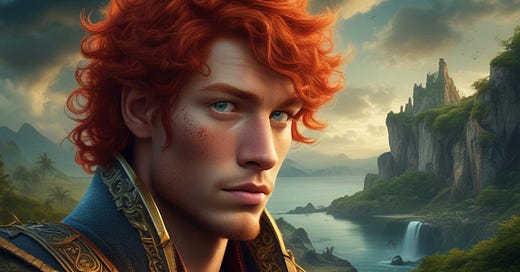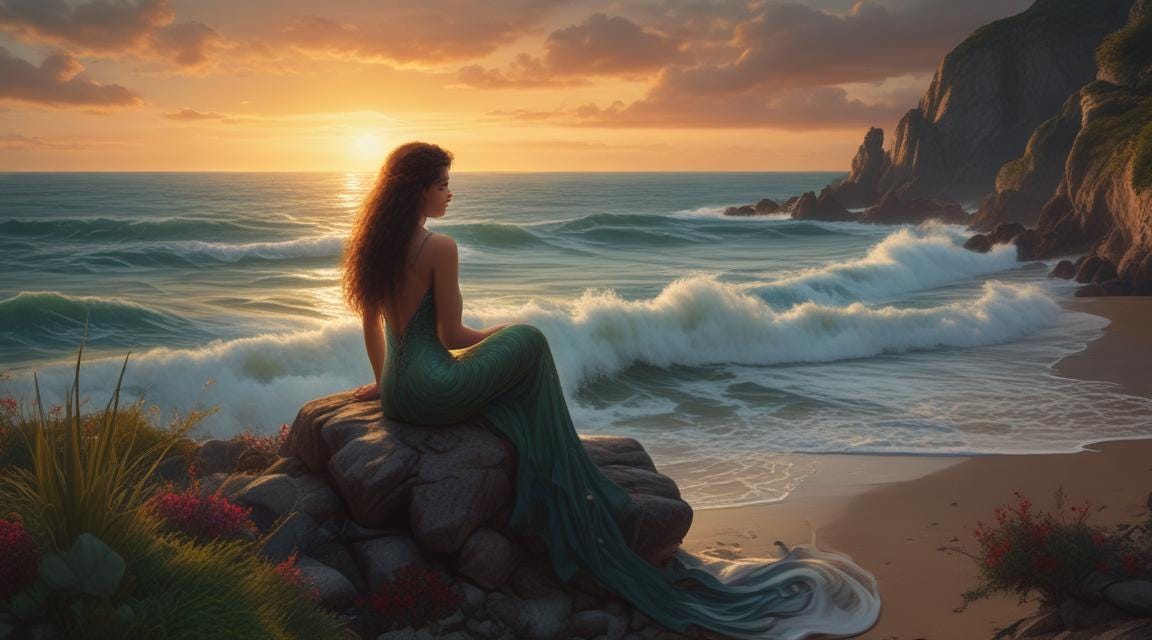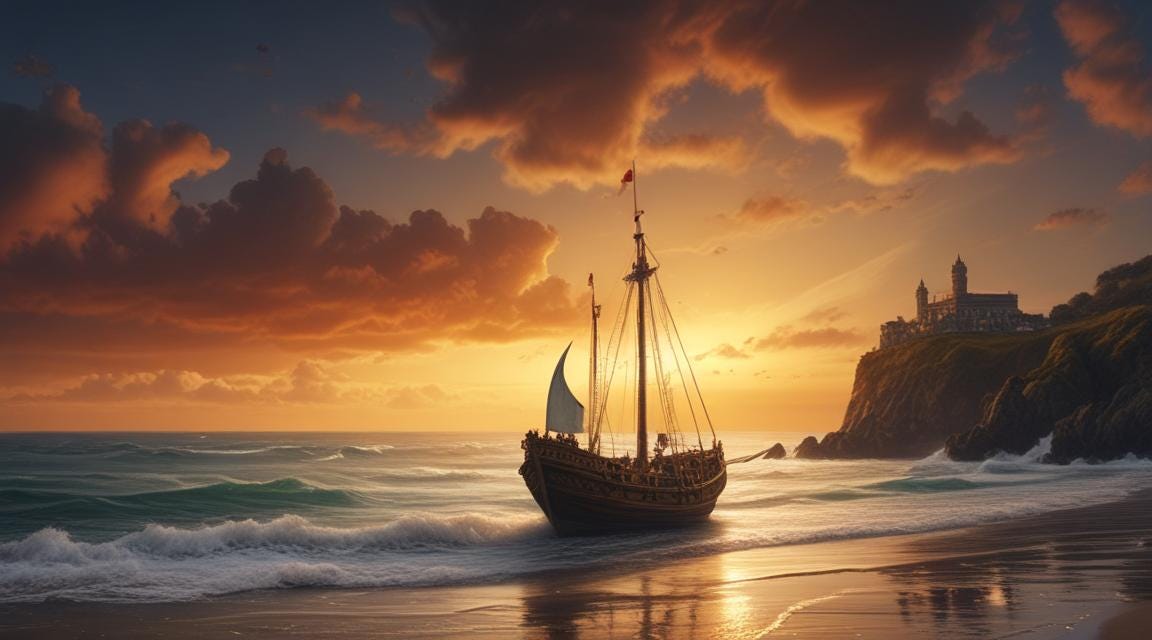Some people while reading portuguese folklore get a little disapointed to find so few sea creatures in it. After all, it is expected that a country of seamen would give special attention to the ocean. It is true that a great part of portuguese folklore does not include the marine creatures, but it’s important to note that a great part of Portugal has no ocean. Many people who lived their entire lives on the mountains or in the interior south of the country would have never seen the ocean, and their imagination would not include it.
But despite all this, portuguese mythology does have a strong connection to the ocean, not only the coastal areas do have legends with marine creatures and with the ocean, but also the foundational myths of Portugal have a connection with the it.
Odysseus (Ulyses)
Ulyses The myth is the nothing that is everything. The same sun that opens the skies Is a brilliant and mute myth - The dead body of God, Naked and alive. This one, who arrived here, Arrived becaused he did not exist. His non-existence was enough for us. Because he did not come, he came And created us. And thus the legend slips away Entering reality, And its fecundation takes place. Bellow, life, half Of nothing, dies. Fernando Pessoa, Mensagem
There is a very well known legend in Portugal about the very famous hero, Odysseus, the greek hero who became lost at sea after the Trojan war. Legend says that while lost at sea, Odysseus arrived to what is today Portugal and founded the city of Lisbon, whose original name was Olisippo, a word derived from the latinized form of the name Odysseus - Ulyses. Even today in Portugal Odysseus is known as Ulyses, not by his greek name.
This legend stems from Strabo, a greek philosopher and historian, who believed that there was a connection between Odysseus and the Iberian Peninsula1:
“Secondly, the expedition of Odysseus, as it seems to me, since it actually had been made to Iberia, and since Homer had learned about it through inquiry (…) for not only do the regions about Italy and Sicily and certain other regions betray signs of such facts, but in Iberia also a city of Odysseia is to be seen (…)2
The city Strabo refers to is Lisbon, and he was not the only ancient writer to make allusion to this. Odysseus is, of course, a mythic character, there is no proof of his existence, but this myth not only inspired many poets like Fernando Pessoa and Camões, but is also part of the portuguese mythological past, so important for a nation’s identity.
It is also interesting and beautiful to see that even before the Age of Discoveries there was a myth establishing a connection between Portugal and a man who, even if unwillingly, was a sea traveller and explorer, someone who met different and unknown peoples and reported their strange customs.
Ulysses 'tis, the Goddess' fane doth raise,
She who on him his eloquence bestows;
If he, in Asia, Troy in ashes lays,
In Europe here by him vast Lisbon grows.' ,
Who is this other who the plain displays
Covered with dead, whose presence fury shows?
In battles great he many has o'erthrown,
For eagles painted on his flags are shown.'
The Lusiads, Chapter VIII, Stanza 5Sea Creatures
Even though there is not an abundance of marine creatures, there are some examples of their presence in portuguese legends, such as the following:
Legend of the Marine Woman3
In the times of Reconquista, a nobleman, whose name was D. Froião, went hunting with two companions. While they were riding, they saw near the seashore a very beautiful woman sleeping, and they understood that she was a marine woman. D. Froião had already heard about these women, but never saw one, so he decided to approach the place she was lying down to take a closer look.
The woman woke up to the sound of someone approaching and tried to escape to the ocean, but D. Froião sent his companions to capture her and take her to his castle.
Everyone was stunned by the woman’s beauty, and D. Froião fell in love with her. So he asked a priest to baptize her so he could marry her. He named her Marinha (Marine) and from then on she was known as D. Marinha.
Legends of sea women and tritons are quite common in coastal areas , so much so that Júlio Dinis, a romantic author from the 19th century, wrote a short story named “O canto da Sereia” (The Siren’s Song) that tells the story of a mysterious song heard at sea at dawn, believed by the locals to be a siren’s song. So, one can conclude that these creatures had to belong to the popular imagination.
Ocean as an Entity
The role of the ocean on portuguese folklore is not limited to be the place where mythological sea creatures dwell, the ocean itself also plays an active role: sometimes as a benefactor, sometimes as an opponent. When the ocean is a benefector, he plays the part of a deliverer, i.e. an entity that delivers important “objects” to people, things lost in time and place:
The Legendary origin of the city name Matosinhos4
A pagan roman named Caio Carpo fell in love with a indigenous woman from Gaia named Cláudia Lobo, and they decided to get married at the beach. While they were celebrating their marriage, a boat approaching the coast was seen, and Caio Carpo decided to check what was inside it. He enters the boat and sees the body of Saint James, the apostle. When he returnes to the beach, he is very emotional and his clothes are tinged (vestes matizadinhas) like scallops. He and every pagan present converted.
The Legend of the Lord of Matosinhos5
According to legend, Saint Nicodemus carved in wood a life size Christ statue and, to protect it from the authorities, threw it into the sea.
Legend says this statue washed up on the shore of Matosinhos, but without an arm. Many miracles started happening and the local population decided to carve an arm to make the statue complete, but all attempts failed.
Fifty years later, a woman found a piece of wood on the beach. She took it home and used it to make fire, but each time she tried to burn it in the fireplace, the wood would jump out of the fire. Her daughter, who was mute since birth, started to speak saying that that piece of wood was the missing arm from the Christ statue, that was now complete.
As Portugal has a very long coastal area, fishing is a common job for the men living on the coast of Portugal. While their wives worked selling the fish, the husbands went into the sea to catch the fish, and many times these men would tragically die because of sea storms. For this reason, the ocean had also the role of opponent. In the Azores6 there’s the belief/legend that when God was creating and molding the world the ocean asked God to give him each day either a man or a palm of land. It was agreed that each day the ocean would receive a man.
Enchanted Islands
(...) They are fortunate isles, They are lands without a place, Where the king lies in wait. But, if we awake, The voice shuts, and only the sea remains. Fernando Pessoa, Mensagem
The belief in the Fortunate Isles derives from the greeks, who believed that beyond the Pillars of Hercules (Rock of Gibraltar) existed enchanted islands with a wonderful climate and a beautiful landscape7. In portuguese literature there are references to enchanted islands, as is the case of “Island of Love” (Ilha dos Amores) in The Lusiads by Camões, and in Fernando Pessoa’s poem “Ilhas Afortunadas” (Enchanted Isles).
But there are also legends about these kind of islands, this first legend is very interesting, because is a continuation of the Legend of the Marine Woman:
The Marine Men and the Enchanted Isles8
D. Marinha and D. Froião had several children and, as they grew older, they begun to feel a terrible fascination for the sea, almost like it was their fado (in this context, fado means an inescapable life path). They knew all the ocean’s secrets, they’ve learnt them through their mother’s stories and by listening to their grandfather’s voice in the conch shells.
One day they decided to explore the ocean in a ship, and discovered a very rich island in the Atlantic Ocean, it had buildings, churches - it was the island of the seven cities. They stayed there for a while and then returned to the continent. They were only able to return to the magical island after the expulsion of the Moors from Portugal, and when they arrived everything was gone, exept the island itself, that was now deserted. They started to discover more and more islands - it was the Azores Archipelago.
The Enchanted Island near Azores9
The next legend is very interesting because it is connected with one of the most, if not the most, important portuguese myth - the Sebastian myth. I will write about this myth later, but for now it is important to understand that D. Sebastião was a portuguese king who died tragically but is still expected by the people in order to restore Portugal.
This story was told by a lady in the end of the 20th century, and it happened in the time of her grandmother.
In the early morning of Saint Jonh the Baptist day, a lady went to a well to get water. After having filled the pot of water she returned home. She felt tired and decided to rest a little, so she put the pot down and looked towards the sea. It was then she saw an island so close to land she could see the crops on the island. She looked around to see if someone was there too, so she could have other witnesses to that mysterious vision, but no one was there, and when she looked again everything was gone.
Since that day, each year, on Saint John the Baptist day, the woman looks towards the sea, hoping she can look again at the isle where the enchanted D. Sebastião lives, but it never happened again. It seems others have also seen this island, but it can only be seen at a certain hour and the person cannot look with the intention of seeing the Island.
Even if the presence of the ocean is discreet, it is still important for the portuguese mythology, since it was the ocean who brought to Portugal one of its founders - Odysseus - and it was the ocean who took away Portugal’s last hope, D. Sebastião - initiating its decline.
https://maislisboa.fcsh.unl.pt/sera-lisboa-cidade-ulisses/ (accessed in September 11, 2024)
STRABO, Geography, Books 3-5, translation by Horace leonard Jones, Book 3, Harvard University Press
https://www.altominho.pt/pt/viver/lendas-e-tradicoes/lenda-da-mulher-marinha/ (accessed in September 12, 2024)
https://www.matosinhoswbf.pt/pages/405 (accessed in September 11, 2024)
https://www.matosinhoswbf.pt/pages/405 (accessed in September 11, 2024)
https://lendarium.org/pt/apl/o-mar/deus-prometeu-dar-todos-os-dias-um-homem-ao-mar/ (accessed in September 12, 2024)
Porto Editora – Ilhas Afortunadas na Infopédia [em linha]. Porto: Porto Editora. [consult. 2024-09-12 17:54:37]. Disponível em https://www.infopedia.pt/$ilhas-afortunadas
https://lendarium.org/pt/apl/navegadores-descobertas/os-marinhos-e-as-ilhas-encantadas/ (accessed in September 12, 2024)
https://lendarium.org/pt/apl/ilhas-encantadas/a-ilha-encantada-perto-do-morrocao/ (accessed in September 12, 2024)








